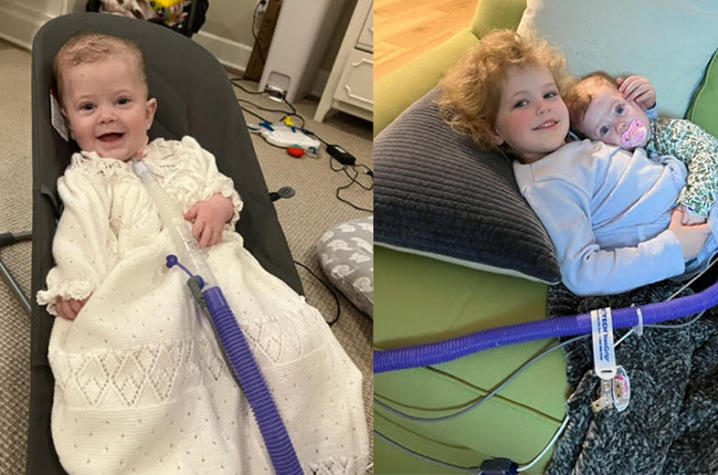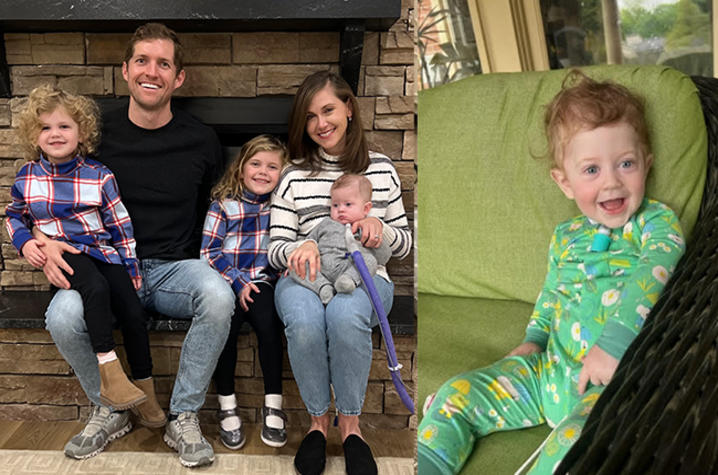Young patient with rare genetic disorder inspires family, providers
LEXINGTON, Ky. (May 31, 2023) — Courtney Woomer’s third pregnancy was, in her words, normal and uncomplicated. She and her husband, Adam, were excited to meet Maisie, baby sister to their other children, Caroline and Callie. All prenatal appointments were unremarkable and genetic testing came back normal. All the Woomers had to do was wait until Maisie made her entrance.
Two weeks prior to Maisie’s birth, Courtney could feel that there was something not quite right. Maisie wasn’t moving as much as she should have been at that point. An ultrasound revealed that Maisie had flipped in the womb and was breech. A week later, Maisie had flipped again. Courtney was induced at 39 weeks, and it was during labor she knew something was wrong.
“Her heart rate would drop with every contraction, so they were having me try all of these different positions to make her more comfortable,” Courtney said. “She was born with the umbilical cord very tightly wrapped around her neck.”
Maisie came into the world on June 30, 2022, floppy and bruised. The Woomers assumed it was from the tight cord and traumatic delivery. Maisie didn’t cry, but she was breathing on her own. She was taken to the hospital’s neonatal intensive care unit (NICU) for further evaluation. When Courtney thought things couldn’t get worse, there was more bad news.
“Later that night, a NICU doctor came to talk to us and said Maisie had none of the newborn reflexes and she was very concerned,” said Courtney. “I didn't sleep a wink that night because I was more worried than I have ever been in my life.”
The next morning, Maisie was transferred to the NICU at Kentucky Children’s Hospital (KCH). The Woomers thought Maisie had a brain injury as a result of the cord around her neck and possible oxygen deprivation. But all diagnostic tests came back normal.
“We were elated but confused,” Courtney said. “She was very weak, couldn't move her core or head or neck. The microarray of genetic tests came back normal. We knew something had to be going on.”
There was one more test to run, and this time Courtney and Adam’s genetic material was also tested. Finally, six weeks after Maisie was born, they had an answer.
Courtney and Adam are both carriers of mutated RYR-1 gene, and Maisie inherited both. The RYR-1 gene is responsible for telling the body’s cells to produce a protein called the ryanodine receptor. RYR-1 serves as “gatekeeper” of calcium within the muscle. Calcium triggers muscle contraction. When the “gate” doesn’t function correctly, the muscles can’t contract. Every muscle in Maisie’s body, from limbs to core to the tiny muscles behind her eyes, was too weak to move.
“RYR1-related diseases are muscle diseases, and Maisie has the severe form,” said David Toupin, M.D., pediatric neurologist at KCH.
RYR-1-related diseases are rare, affecting approximately one in 90,000 in the United States. The true number is likely higher, as RYR-1 diseases are often misdiagnosed.
“It took me a long time to wrap my head around this,” said Courtney. “Lots of tears and ‘why her?’ thoughts. But to be honest, I was relieved when we got the results. Also devastated, but glad to have an answer. When we received Maisie’s diagnosis, we immediately started researching and tried to learn as much as we could about RYR-1 related diseases.”
A new diagnosis meant a new care plan. Maisie already had a gastrostomy tube inserted to deliver nutrients, but she still needed help to breathe. Courtney and Adam were hesitant to have tracheostomy placed.
“We kept thinking, desperately hoping, that she just needed more time,” Courtney said. “It was a very difficult decision because Maisie does not require much support from the ventilator — just minimal pressure support settings. The thought of electing to have a hole put in your innocent baby's throat was so hard. I felt guilty doing that to her and wanted to make sure it was the right decision.”
But in the end, the Woomers decided to proceed with the tracheostomy. It allowed Maisie to come home and have more strength for therapy.
“Maisie has been getting stronger and is now able to spend about 30 minutes a day off the ventilator,” said Michael Anstead, M.D., pediatric pulmonolgist at KCH. “I think within three months, she may be off the ventilator when she’s awake and just use it to get extra rest to her breathing muscles when she sleeps.”
It’s not just Maisie’s lungs that are getting stronger. She receives regular physical, occupational and speech therapy and has already made great strides in gaining strength. Gradually, Maisie has reduced her dependency on the ventilator. She has more control of her core and neck muscles; even the tiny muscles behind her eyes are stronger and she can track movement and watch and react to her sisters during playtime.
“Maisie is doing very well and making so much progress,” said Courtney. “She is in physical therapy twice a week, occupational therapy once a week and speech every other week. She is so strong. She faces all her challenges with a smile on her face and is determined.”
Early in Maisie’s diagnosis, the Woomers briefly considered other hospitals for her treatment, but ultimately decided to stay at UK.
“The nurses are angels from above; we still keep in touch with them, and they’ve become part of our family,” said Courtney. “I cannot say enough nice things about Dr. Toupin. He is more genuine and kinder than any doctor I've ever seen. Dr. Anstead is wonderful. I will never forget what he said at our first appointment — ‘The vent is your friend, Maisie, but we don't want it to be your friend forever.’ I was so happy to hear him say that and I could have hugged him. The optimism is what keeps me going.”
Anna Bullard, a licensed clinical social worker in the NICU, met Maisie and her parents a few days after they transferred to KCH. Her role is to support the family unit as they navigate the emotions and hard decisions that can come up in the hospitalization.
“It’s been amazing to watch the Woomer family travel from the fear and worry that came with Maisie’s first weeks of life to balancing being both family and an integral part of her medical care team,” said Bullard. “Maisie is as resilient as she is happy. I think it comes from a tenacious curiosity to know everything she can about the world around her."
As Maisie approaches her first birthday, Courtney and Adam marvel at her progress, and can’t wait to see how she continues to grow and get stronger. Many children diagnosed with RYR-1 related diseases gain enough strength and mobility to live independently.
“We have high hopes for her,” said Courtney. “She has two sisters who are her biggest cheerleaders, and her dad and I could not love her more. She is a gift, and it is our privilege to be her parents.”
UK HealthCare is the hospitals and clinics of the University of Kentucky. But it is so much more. It is more than 10,000 dedicated health care professionals committed to providing advanced subspecialty care for the most critically injured and ill patients from the Commonwealth and beyond. It also is the home of the state’s only National Cancer Institute (NCI)-designated Comprehensive Cancer Center, a Level IV Neonatal Intensive Care Unit that cares for the tiniest and sickest newborns and the region’s only Level 1 trauma center.
As an academic research institution, we are continuously pursuing the next generation of cures, treatments, protocols and policies. Our discoveries have the potential to change what’s medically possible within our lifetimes. Our educators and thought leaders are transforming the health care landscape as our six health professions colleges teach the next generation of doctors, nurses, pharmacists and other health care professionals, spreading the highest standards of care. UK HealthCare is the power of advanced medicine committed to creating a healthier Kentucky, now and for generations to come.






